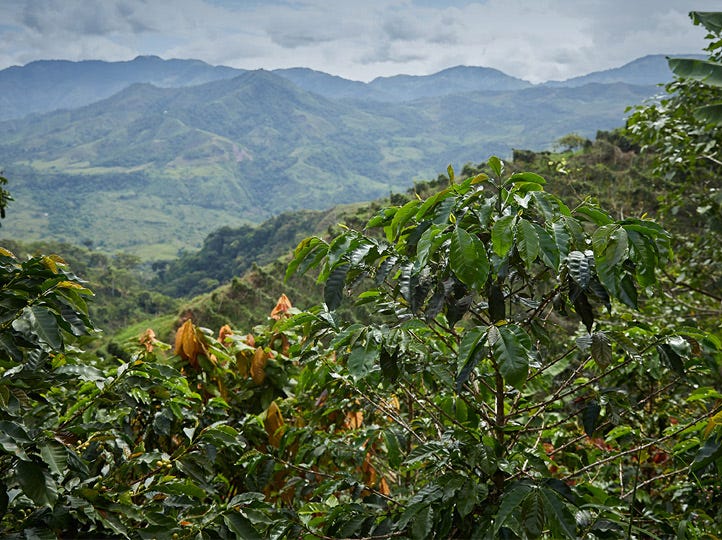Colombia La Cabana
| Castillo, Caturra |

La Cabaña is a project started by young farmer Danilo Perez in Peñas Negras, Pital, south Huila. The principles of quality and innovation lie at the heart of La Cabaña. Danilo has focussed his attention on producing small batches of highly differentiated coffees. Extended fermentation has been introduced to the processing regimen alongside traditional washed, natural and honey; while varieties which, with the right care and attention, lend themselves to excellence in the cup such as pink bourbon and gesha, are also cultivated.
The Region
The biodiverse 'paradise' where La Cabaña Farm is located, provides the some of the most privileged environmental condition. Soils are extremely fertile in organic matter, while water availability, temperature, solar radiation and wind are optimal for cultivating high quality arabica. The fertility of the farm means that fresh coffee is available close to year-round. The plantation has 250,000 coffee trees distributed in 40 hectares, producing over 192 tons annually.
The Huila region is well known for its coffee quality, but also for being the first historical department in Colombia to begin coffee production. Farmers in Huila are very quality-conscious. Their crops receive a lot of care and attention and they tend to be the most pioneering when it comes to embracing new processing and farming methods. The most relevant municipalities for coffee in Huila are: Pitalito, Garzón, Gigante, San Agustín, La Plata, Paicol, Acevedo, among others.
Huila coffee represents 18% of Colombian production. It is always in high demand and is often preferred as a single origin offering for its balance of acidity and sweetness. The Huilan landscape is dominated by volcanos and mountains, providing a rich terroir of high altitude and fertile soils and offering a wide range of ecosystems where coffee can be grown. There are producing farms ranging from 1,500 m.a.s.l. up to 2,300 m.a.s.l., conferring great attributes to the cup profile such as bright acidity and characteristic sweet notes.

History of Coffee in Colombia
As with many coffee origins, it is believed that coffee was first brought to Colombia by priests, arriving, perhaps, within a decade or two after coffee first came to the Americas via the Caribbean in the first half of the 17th century. It was likely a garden crop grown for local consumption and barter for decades. Unlike other coffee regions, we have the story of a priest named Francisco Romero, who could be called the father of commercial coffee cultivation in Colombia. The folkloric tale goes that in the early 1800’s, Father Francisco, hearing confessions in the north eastern town of Salazar de la Palmas, assigned planting coffee to his parishioners as penance for their sins. The Archbishop of Colombia heard about this and ordered all priests to adopt the practice. Commercial production of coffee expanded quickly, moving into regions where the growing conditions were ideal.
